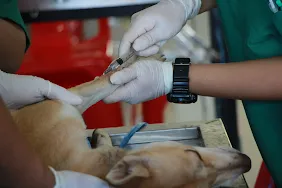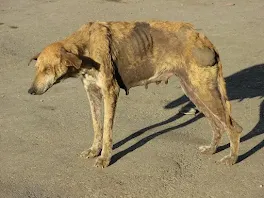For centuries, dogs have been serving humans with their loyalty, companionship & unwavering love, which has helped them to earn the title of "man's best friend".
In return, it is our responsibility to ensure their health & well-being.
When talking about their well-being, various aspects one should consider & vaccination is one of them.
As humans, dogs should need vaccination to protect them from various deadly diseases.
In this "dog vaccination schedule India with price" guide, we will dive into the world of dog vaccination in India, covering all the crucial aspects like its importance, schedule & where you can get your furry friend vaccinated.
So without further adieu, let's jump in!
What is Dog Vaccination?
Dog vaccination is a prevention measure taken to administer dogs with vaccines containing antigens that mimic specific disease-causing agents, such as viruses or bacteria, boosting & stimulating their immune system.
When a dog is vaccinated, their immune system produces antibodies to fight the antigens.
This process also helps dogs develop immunity against the targeted diseases without falling ill.
Importance of Vaccination for Dogs
Below, we are sharing five crucial reasons for vaccinating your dog.
1. Disease Prevention:
Vaccination protects your dogs from life-threatening and devastating diseases like canine distemper, rabies, parvovirus & hepatitis.
If your dog is not vaccinated & if they get infected with any of the above diseases, their chance of survival is slim to none.
2. Public Health:
Certain diseases can be transmitted through dogs to humans, such as rabies.
By vaccinating your dog, you won't only be serving your furry companion but also contributing to public health.
3. Cost-Effective:
Prevention is better than cure.
Vaccinating your dog will be affordable in comparison to treating a sick dog. Along with saving money, you will also protect your pet from suffering.
4. Legal Requirement
In India, 18000-20000 deaths happen every year due to rabies.
If you want to protect yourself from legal consequences, fines or removal of your pet, ensure to vaccinate your dog against the rabies.
5. Peace of Mind:
Knowing that your dog is vaccinated and free from deadly diseases will give you peace of mind & aid in living a long & happy life together.
Types of Dog Vaccines in India
There are several vaccines available for dogs in India & below we will be sharing the most common ones.
1. Rabies Vaccine:
Rabies is a contagious disease that can affect both dogs & humans. Hence, it is mandatory to vaccinate your dog against rabies annually.
2. Core Vaccines:
Core vaccinations are required to protect your dogs against diseases like canine distemper, hepatitis, and parvovirus.
Puppies typically receive a series of core vaccines in their early months, followed by periodic booster shots.
3. Non-Core Vaccines:
Non-core vaccines are administered to protect your dog against kennel cough, leptospirosis, and canine influenza.
Veterinarians consider your dog's lifestyle and risk factors while administering non-core vaccines.
Dog vaccination schedule India with price
Puppy Vaccination Schedule
A well-planned vaccination schedule is crucial for puppies as they are more vulnerable to life-threatening diseases.
Adult Dog Vaccination Schedule
Where to Get Your Dog Vaccinated
1. Veterinary Clinics:
The veterinary clinic is the most common place for your dog to get vaccinated.
A veterinarian can guide on the best vaccines according to your dog's specific needs.
2. Animal Welfare Organizations:
Several animal welfare organizations or government agencies organize vaccination camps, especially for rabies, charging low amounts or providing services free of cost.
Ensure that you keep track of such events in your area.
Tips for Getting Your Dog Vaccinated
Want a smooth vaccination experience for your dog? Ensure to follow the four steps provided below.
1. Consult a Veterinarian:
If you want a personalized vaccination schedule for your dog, do not hesitate to take the help of your nearby veterinarian.
2. Keep Records:
Try to keep a record of the vaccination, including the administration date, type of the vaccine, and side effects, if any, which will help you stay on top of booster shots.
3. Monitor your dog:
Keep on monitoring the dog at frequent intervals after vaccination.
If you see any adverse reactions such as swelling, lethargy, or loss of appetite, immediately contact your vet, which will help you minimize the risk.
4. Avoid Over-Vaccination:
Yes, vaccinations are required, but overdoing it can damage the health and well-being of your pet.
Schedule a meeting with your vet to determine the appropriate vaccines and their frequency for your dog's lifestyle and health.
Conclusion
It will not only safeguard your furry companion's health, but it will also safeguard the entire community.
Understanding the importance of vaccination, following a schedule, and planning frequent visits to your veterinarian will ensure that your canine friend will enjoy a long and healthy life by your side.









0 comments:
Post a Comment